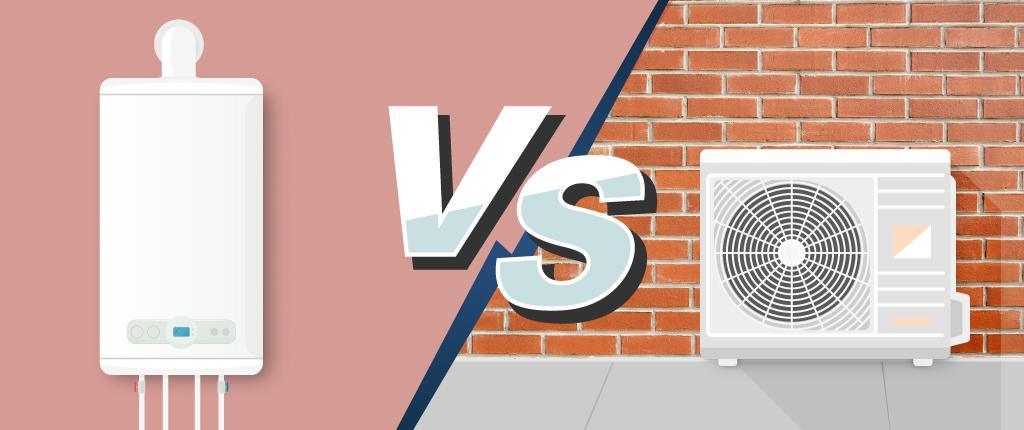
While the argument was going on in New York City, by Brooklyn brownstones, Queens multifamily homes, Manhattan co-ops, and Staten Island houses, it has been heard by many that the question of whether to keep using the traditional gas boilers or to switch to the new heat pumps is increasingly raised.
Rising energy costs, stricter climate policies, and ever more electrification incentives are changing how people in New York think about home heating.
Returning local Law 97, which will take effect in 2024–2025, sets emissions limits for larger buildings and thus pushes owners to consider non-gas-dependent heating systems. And the thing scaring people most about this is the news about the 2025 gas boiler ban, which is making landlords and homeowners seriously consider long-term options than ever before.
This manual compares heat pumps and gas boilers based on real needs in Brooklyn, Queens, Manhattan, and Staten Island so that home buyers can make informed decisions before the next heating season.
The Changing Heating Landscape in New York: Heat Pumps or Gas Boilers
A large number of NYC households are ending their reliance on gas boilers and turning to heat pump installation. The reasons why they do so are reasonable in every respect: they reduce emissions, lower their operating costs, and enjoy new financial incentives.
With the help of Con Edison’s Clean Heat Program and NYSERDA, a large part of the installation cost is covered through the high heat-pump incentives they are offering. Across NYC, the development of hybrid systems—combining a boiler with a heat pump—is moving very quickly, as owners want to keep their systems flexible for severe winter cold.
The transition is indeed underway: polls indicate that more than 60% of NYC homeowners are currently considering electric heating, though they may not intend to make a move right away.
Gas Boilers: Time-Tested Power for Older NYC Buildings
How Gas Boilers Work in New York Homes
In Brooklyn brownstones and Manhattan pre-war buildings, gas boilers remain the most common and structurally compatible heating system. They heat water and circulate it via radiators or baseboards, creating consistent, steady heat.
They can do this because they’re compatible with older hydronic systems, and New York gets pretty cold in winter. There are still many multi-unit buildings that rely on central boiler rooms as their primary source of heat, which have been doing so for decades.
Pros of Gas Boilers
- Super dependable in icy conditions
- Integrates effortlessly with present radiator systems
- Perfect for going with old or large multifamily buildings
- Faster warm-up and high heating output
Cons of Gas Boilers
- Greater release of greenhouse gases
- An increasing natural gas pricing trend all over New York
- Could be up against regulatory constraints in the future
- Lower efficiency compared to heat pumps (usually 80–95% AFUE vs. 200–300% efficiency for heat pumps)
When Should You Choose Boiler Repair in New York or Upgrade?
Low pressure, noisy pipes, leaks, and burner failure are among the most common boiler problems in old buildings with aging boilers.
Repairing the boiler with the help of local professionals from Brooklyn, Queens, and Manhattan is one way to prolong the system’s lifespan; however, for units more than 20–25 years old, the solution might very well be replacement with a new high-efficiency or hybrid model. Local technicians will conclude as to which option – repair or replacement – will bring the best return.
Heat Pumps: The Future of NYC Home Heating
How Heat Pumps Work in a Cold NYC Climate
Especially Mitsubishi Hyper Heat systems, today’s cold-climate heat pumps can maintain their efficiency even when the temperature is below zero. It is a fact that many NYC homeowners are unaware that modern heat pumps can generate heat as low as -13°F, thus covering almost all conditions of an NYC winter.
Air-source heat pumps are the most widely used in the city, but there are instances of ground-source heat pumps in luxurious apartments or deep retrofitted projects.
Advantages of Heat Pumps
- Up to 300% more efficient than gas heating
- One system can perform both heating and cooling functions.
- Perfect for compact spaces and apartments in Manhattan
- Qualifying for substantial state and utility rebates
- Reduced carbon emissions and long-term operating costs
Some Drawbacks to Consider
- Initial higher installation cost
- Lower efficiency at very low temperatures (below 10°F)
- Old houses in NYC might need electrical upgrades.
- The outdoor units should be positioned correctly in close-row house neighborhoods.
Cost Comparison: Heat Pumps vs. Gas Boilers in NYC
Installation costs are significantly different from one borough to another and also depend on the building’s structure and the size of the system.
The cost of installing a gas boiler can vary between moderate and high depending on factors such as venting, piping, and the level of the equipment. The initial costs of heat pumps are usually more than that of gas boilers, but rebates help to bring down the total substantially.
On a daily basis, heat pumps are the better choice for energy consumption, especially when combined with smart thermostats and weatherization upgrades. Though the maintenance costs for heat are on an average level, they may become more expensive as the machines get older.
Besides that, heat pumps are also in the line to be eligible for federal tax credits and Con Edison rebates that can reduce the total of the installation costs by thousands of dollars.
Environmental and Long-Term Benefits
Heat pumps today can be run on electricity. It is becoming cleaner every year, as New York is focusing more on renewable energy sources. Ultimately, this puts heat pumps in a leading position when it comes to the electrification roadmap of NYC and its 2050 carbon neutrality target.
Gas boilers emit carbon dioxide through the burning of fossil fuels, thereby depending on a source of energy that causes climate change. They are one of the biggest contributors to air pollution in cities and the main reason behind Local Law 97.
One option on the horizon is hydrogen-ready boilers; however, they are still far from being a standard solution in NY and as such, they can only be considered as a transitional alternate
Choosing the Right System for Your NYC Property
By Property Type
- Brooklyn Townhouses: Hybrid (boiler + heat pump) or ultra-efficient boilers
- Manhattan Apartments: Ductless mini-splits or air-source heat pumps
- Staten Island Homes: Gas boilers are still widely used, but hybrid configurations are increasing in popularity.
- Queens & Bronx Multifamily Units: Heat pump installations are increasing in new developments, but boilers remain the primary heating source.
Professional Consultation Is Important
Every NYC borough differs in terms of load requirements, building code rules, and architectural challenges. A professional assessment can determine whether a heat pump, boiler replacement, or a hybrid system is most suitable for your property.
Book a free heating assessment in your borough to get a better idea of your building’s exact requirements.
Frequently Asked Questions on Heat Pumps vs. Gas Boilers
Are heat pumps efficient in New York winters?
Indeed, nowadays cold-climate heat pumps are very efficient even at temperatures below zero.
Do I have to replace my gas boiler in NY before 2025?
Old, inefficient boilers may be subject to restrictions and incur higher operating costs in the future.
What’s the difference in the installation cost of a heat pump and a boiler in Brooklyn?
A heat pump has a higher upfront cost. But it saves money in the long run; a boiler is cheaper to install but more expensive to operate.
Can I install a heat pump if I want to keep my boiler?
Definitely—hybrid heating systems are gaining traction in New York.
Which heating systems are eligible for Con Edison or NYSERDA rebates?
The most significant incentives are given to heat pump systems.
Making the Right Choice for Your Home
Handling heating units is no walk of park for New Yorkers. While gas boilers have certain limitation in delivering power to the old buildings, heat pumps can compensate it by offering efficiency, cleaner energy, and long-term costs. Consider factors like building type, heating requirements, and future plans while choosing your heating solution for your home.
Stop worrying about where you are. Regardless of whether you have a brownstone in Brooklyn or an apartment in Manhattan, Arnica Heating and Air Conditioning Inc. is available to assist you in making the proper change for comfort, efficiency, and savings.

Simone Arnica is the certified and more than 35 years experienced HVAC expert from Arnica Heating and Air Conditioning Inc. suggesting maintenance tips for the HVAC system to protect it from early damage, unwanted maintenance cost and also to save on energy cost. Follow the blog to learn how it can be done easily.




Leave a Reply
You must be logged in to post a comment.